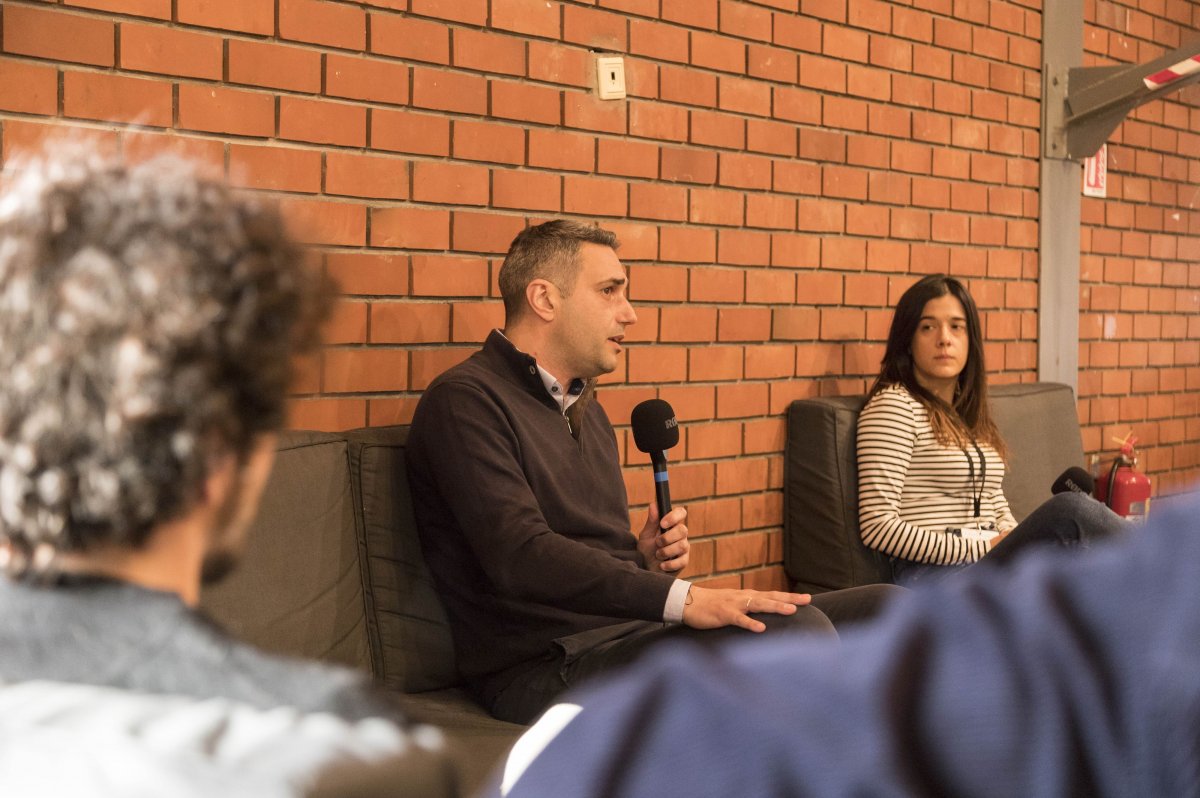The discussion on Energy communities as driving forces for a socially and environmentally sustainable filming was held on Thursday, March 9th, within the framework of the Climate Hub, the new initiative towards the goal of sustainability launched by the Thessaloniki Documentary Festival. It includes a series of talks with the participation of important organizations, groups, and experts with experience in environmental and social sustainability issues, discussed in the context of their application in the audiovisual sector.
The fifth session of Climate Hub featured a discussion on climate change and the just transition to a clean energy system. It explored the concept of climate change, energy communities, and how to ensure that this energy transition is fair, inclusive and democratic. The main speaker of the event was Dimitris Kitsikopoulos from ELECTRA ENERGY Cooperative, while the discussion was moderated by the Festival's sustainability coordinator, Emma Doxiadi.
Ms. Doxiadi introduced Mr. Kitsikopoulos to the audience, who began his speech by stating that the cinema industry is a significant consumer of energy. "I am surprised that we have not yet been approached by anyone from the film industry. In general, we are approached by many people from the agricultural and tourism fields. We are a Co-Op that has been supporting citizens and businesses since 2016 to create energy communities; we teach them how to produce their own energy and be sustainable collectively. We are usually out in the field, supporting municipalities and local communities. I am happy to accept the invitation from the Documentary Festival, with the prospect of making documentary filmmaking more 'green', a goal that is both socially and democratically beneficial," he commented.
In response to a question posed by Ms Doxiadi regarding the meaning of justice in the energy community, he stated that: " Since 2015, the role of citizens in the issue has been recognized in the Paris Agreement on climate change. It is not solely the responsibility of the state, but it operates on an individual and collective level. Subsequently, the European Commission published a series of Directives that recognized the role of citizens in clean energy and called on Member States to adopt them. This was the first Directive for an institutional framework around the energy community. The first law came to Greece in 2018, when the institutional framework was created in our country. Energy communities are legal entities,” he noted.
He then elaborated on the conditions of a just transition. "Once we accept the transition to renewable energy sources, no one should be left behind. A lot of money is being invested in this sector and the role of society must be substantial so that the benefits are spread to all of us. We, as a Co-op, do not produce energy, but we act in an advisory capacity in many parts of Greece and the Balkans. However, because there is an institutional framework, the Directive from the European Commission and a very specific direction from the European Union, I am optimistic that we will reach energy democracy. The willingness of citizens is important, but energy democracy is a marathon," he explained.
At this point, he analyzed the self-consumption model. 'It is a simple and favorable model for both companies and citizens. An energy community can build a photovoltaic park. This energy will be recorded by the operator and offset against the consumption in the company or in the citizen's home, resulting in a reduction in the bill. Some people decide to sell the electricity from their photovoltaic panels, but our model has a greater benefit; when you sell electricity, you sell it at wholesale prices, whereas with this model, you pay the bills at retail prices. It is a favorable model, which could also be adopted by film companies. The cost is reduced and the result is environmentally neutral from an energy perspective."
Regarding specific proposals for the film industry community, Mr. Kitsikopoulos suggested the following: "For indoor spaces, we have an easy energy transition to renewable energy sources, with participation in an energy community. For outdoor spaces, on the other hand, the best solution is the use of a hybrid system with photovoltaics, batteries, and electric propulsion. It is a holistic approach. In Greece, at the moment, there are more than 30 energy communities doing impressive things. If someone wants to participate, the first step is to search for communities in their Region, as energy communities operate at the Regional level. We have a role in networking and designing proposals," he said.
Then on the subject of renewable energy, he commented: "Ten years back, the participation of renewables was negligible, about 1-2%. Now it's touching 30%. Energy parks have a high construction cost but zero operational cost, unlike other fuels. By 2035, we will be able to rely on renewables for 80% of our energy. The issue is to make this happen fairly, with social justice." Finally, he emphasized that the energy market is strictly regulated, based on an institutional framework that is constantly changing. “New laws are constantly being passed, and this constant mobility is also related to climate change," he concluded.















